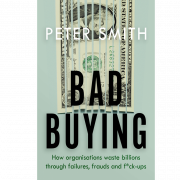Guildford Council “Fraud” – WTF?!
After writing last week about competence in UK local government, as if by magic, a case of alleged fraud in a council very close to my home popped into view the other day.
Now several of my local councils haven’t been doing very well in recent years in terms of looking after taxpayers money. The Tory council in Surrey Heath, where I live, now ousted by the LibDems, bought well over £100 million worth of commercial property in Camberley right at the top of the market, and is now sitting on a loss in asset value of £50 million or so. Woking council, a few miles to the east, has basically gone bust after property deals and investments that make Surrey Heath’s look minor.
And now Guildford, to the south-east, has published a report into what is an alleged fraud and is at best a prime example of Bad Buying in its housing department. Two employees have been suspended and five agency workers had their contracts terminated.
The report to the Council by Jeanette McGarry of SOLACE, (the society of local government CEOs), is good but focused more on the governance issues rather than the procurement events. That may be because the matter is with the police now and an arrest was made in March, so precise details of the core issues may be sub judice.
But basically, a contractor working on the council’s housing stock was paid far more than the original contract value (which is not disputed) and also there was a possibility (as the report says),
- That work may have been ordered when it wasn’t necessary;
- That work may have been ordered, invoiced and paid for when it was not completed at all or;
- Not to a satisfactory standard;
- That duplicate invoices may have been submitted and paid for the same work;
- That works may have been ordered and undertaken that were not the responsibility of the Council.
Back in 2022, the council agreed to spend £24.5 to update its housing stock. But there were no in-house surveyors and doesn’t appear to have been much in the way of internal procurement either, as “Several agency staff were appointed and were able to appoint housing repair and maintenance contractors”.
A three-year contract for £2.4 million was agreed for EICR (electrical installation condition reports) testing and inspection to Seville Developments Ltd, “under direct award” via a framework. This was apparently achieved under the Council’s procurement process and “was found to be compliant”. I’d like to know more about how a direct award of that size could be acceptable, and if there was no competition within the framework, but the report does not go into that.
But the council realised in 2023 that expenditure had reached £18.9 million with Seville, with no authorisation or action taken such as contract variation. At this time, “the Corporate Procurement Team was staffed solely by temporary officers and there is evidence that an officer identified the unauthorised expenditure and raised this with the Housing client but did not escalate the matter”.
Whistleblowing concerns were raised in 2023, and the staff suspensions and terminations took place in September 23, and in March 24 “An arrest was made by the South East Regional Organised Crime Unit”.
If we look at the anti-fraud measures outlined in my Bad Buying book, we can see a number of flaws in the Guildford process. There will I suspect be questions around the lack of transparency in supplier selection. Then we have the issues on signing off work – was that power too concentrated? Perhaps the biggest question is how on earth invoices that exceeded the contract value by £16 million got signed off and paid – that entire budget control process at Guildford must have been absolutely pathetic.
But an interesting point which is not one I really covered in the book is this dependence on contractors and temporary staff. To have a procurement team that is entirely “temporary officers” brings obvious dangers. It is not that contractors are necessarily crooks, but they cannot have the knowledge of the organisation and the internal relationships that are vital when things go wrong or strange events occur.
I also don’t understand why if Guildford was so short of staff, they didn’t call on Orbis for help. Orbis is the shared service organisation, hosted by Surrey County Council, that runs procurement for Surrey, East Sussex, and Brighton councils, and does a pretty good job. Surely they could have assisted Guildford if the council there couldn’t find its own procurement staff?
Anyway, another case study for “Bad Buying 2”!









